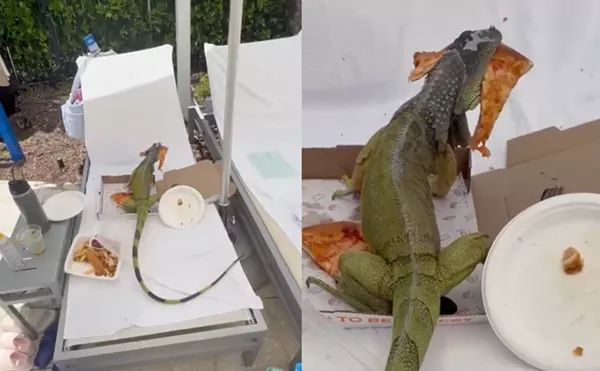Ice crunches underfoot in the freezing walk-in at Florida's Finest, a boutique seafood vendor in Lauderhill with 150 clients around Florida. What had been an 80-pound yellowfin tuna has been sawed in half and placed in giant bins filled with ice shavings. Its carcass rests on ice, skin down, meat and bones on display to ensure ice doesn't touch the product.
A plastic laundry basket sits in the middle of the room, filled with dozens of snapper with iridescent yellow tails. Two men at stainless-steel tables wear yellow rubber overalls, giant waders, hats, and fingerless gloves as one skins fish and another preps an order.
Proprietor Todd Jaffy, a tanned and lean Floridian, explains his daily struggle. "The more uneducated a chef, the better a vendor can do," he says. It's the number-one issue that chafes him, as competitors sell humble fish as prized ones, such as farmed tilapia at grouper prices. Jaffy says his job is as much to educate his customers as to provide them with the best product, a responsibility not embraced among all wholesale dealers.
Jaffy is one of the ethical vendors, the middlemen Florida requires for what it cites as safety reasons. A 60-year-old state law requires restaurants to buy fish from middlemen with the exception of the few adjacent to a marina. It's a law with good intentions for safety, but it also has an unfortunate consequence: Because of it, most of the fish served in South Florida restaurants comes from elsewhere.
Worse, Florida has no system in place to penalize dealers or restaurants that deliberately mislabel fish. The Food and Drug Administration is supposed to pursue and penalize such fraud, but little monitoring and an increase in imports have led to a spike in fraudulent seafood sales, according to a 2010 Congressional Research Service Natural Resources Policy Report. Though a new DNA test called barcoding is the FDA weapon to prevent misbranding for the future, use of this technology is in its early stages.
State regulators say they're more worried about health violations. As Sterling Ivey, a spokesperson for the Florida Department of Agriculture and Consumer Services, told me: "We're focusing on seafood from a safety standpoint. We're making sure the staff has proper hand-washing stations. We're making sure there are no rats and rodents. Our resources are not allocated to pursue fraud."
And that means middlemen in Florida can misrepresent fish. This practice deludes people into believing that the market is rich with fish when many populations are strained or dwindling. Middlemen also stifle the introduction of sustainable species to the market. They're looking for species that sell. They're filling quotas. This system dulls everyone's incentive to learn about local fish.
Chefs and market owners should have the opportunity to buy directly from Florida fishermen. Not only would that drive down the retail price of seafood but it would allow chefs to build direct relationships with trusted fishermen, resulting in fresher, locally caught fish on our plates without sacrificing safety.
Allowing chefs to buy from fishermen would give diners the opportunity to eat more local, sustainable seafood. Vendors are reliant on imbalanced trade laws that ensure we're eating fish from elsewhere. More than three quarters of the 5 billion pounds of fish eaten in the U.S. each year — less-valued species such as farmed shrimp and catfish — is imported. Meanwhile, the U.S. exports 2.7 billion pounds of higher-valued fish like ahi tuna to overseas markets for a higher price.
It was late morning when Jaffy took me through his facility, hours after the guys had returned from delivery rounds that started at 2 a.m. "I don't work with chefs who don't know fish," he said. Or rather, he works with chefs who know they'll have to pay for the good stuff.
Chef Josef Schibanetz, who opened Josef's Table in Boca Raton this past December, is one of those who pays for the good stuff from Florida's Finest. A French-trained Austrian chef, he has lived in South Florida for 30 years. A restaurant among many in an upscale strip mall, his white-tablecloth place features an open kitchen, copper accents, reclaimed rustic hutches, and oak floors. The outside says shopping plaza, while the inside references a European farmhouse.
"Things have changed since I started," he said. Schibanetz's former restaurant, Josef's in Plantation, earned a loyal clientele and won an award as Best Restaurant in Fort Lauderdale from New Times in 2007. Fish, he explains, used to be for special occasions. "Now people eat fish sometimes three or four times a week," he said. With so many people eating more seafood more often, there just isn't enough to go around.
Though Schibanetz says he tries to carry regional and sustainable seafood, on this particular night, Chilean sea bass was the menu addition, pan-roasted and served among shiitake mushrooms, sliced fingerling potatoes, and a zucchini hash in a beurre blanc for $34.
It was a picturesque but underseasoned dish. "Boca folks don't like salty dishes," said the couple who joined me for dinner. Both of them had been chefs who ran a restaurant in the area. "You have to accommodate your clientele."
Jaffy also must accommodate a clientele that prefers seafood from the north. At least half of the fish at Florida's Finest comes from cold waters. "Smell these scallops," says Jaffy, opening a vacuum-packed vat of giant translucent mollusks. "Smell how fresh they are." They were from New England.
Scallops and lobsters are on just about every seafood restaurant menu in town for $25 to $35 a pound. Jaffy thinks that's reasonable. "The U.S. is a dumping ground for fish because we won't pay top dollar, like they do in Europe and Japan," he says. That we're looking for a deal is what allows unethical vendors to pump past-prime fish with preservatives and food coloring. It's what allows vendors to pass off tilapia as yellowfin.
And it's tolerated not just by consumers but by the government.
Jaffy tries to stay away from doctored fish. At the stainless-steel table in the walk-in, a man in overalls places his gloved hand on a tuna flank. He expertly dissects the flesh. It smells like the sea. "Look at those veins and that hue," he says of the fish, reeled in by a local boat. "It's a beautiful tuna."










